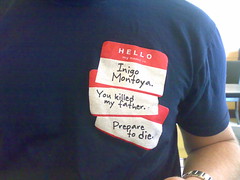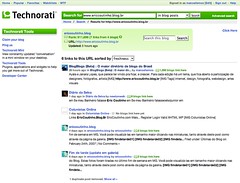I, Jared Matthew "Jay" Garmon, am a professional geek. Specifically, I am a
writer,
husband & father,
technologist,
science fiction nerd, and
self-professed trivia expert. Each of these aspects is entertained at different venues around the Web, as listed below.
Technologist: First and foremost, I am the VP of Product at
Finvi, where I try to build some cutting-edge SaaS fintech. I've founded and sold a startup or two in my day, run a $2 billion healthcare transaction platform, built actual factual AI solutions, and once wrote an
online spoof of the Daily Show focused on the stars of the Food Network.
As sidelines and consulting work, I have advised on social media and emerging technologies for the Louisville Digital Association (for whom I have served as both president and vice president),
Louisville EnterpriseCORP (for whom I was a founding member of their advisory "Justice League"),
XLerateHealth (for whom I was a founding director), organized the Louisville Geek Dinner, and, as a guest instructor, helped inaugurate a Social Media marketing curriculum at the University of Louisville.
Writer: This post is hosted on
Jay Garmon [dot] Net, which is my personal blog where I prattle on about whatever topics interest me with very irregular frequency. You can also find herein copies of my
science fiction short stories that I have "trunked," which is a euphemism for "given up on trying to publish." Yes, I have written other sci-fi shorts, exactly
one of which has been sold for professional publication (though it did
make the Tangent list...barely). I haven't written any fiction since my second child was born more than a decade ago, but I hope someday to return to the practice, which is why I started the
Aldebaran Roundtable writers group.
I also technically
share a screenwriting credit with David Goyer, but that was for a contest, not a job. (I won.)
As to the majority of the writing work for which I've been actively paid, look no further than
my LinkedIn profile, and you'll see I've made my living in whole or in part by stringing together words for CNET, CBS Interactive, Scholastic Library Publishing, TechTarget, Backupify, Talla, LinkSquares, Patlytics, Neurometric AI, Rally UXR, and Practical Assurance. But that's all non-fiction, so it doesn't count.
Husband & Father: I have the requisite
Facebook page for the disseminating of pictures of my daughters, wife, friends, cats, travel, and Star Trek memes, but -- fair warning --
I also do the "talking about politics" thing there. Don't go if you're sensitive about your votes or policies.
Science Fiction Nerd: I have whittled a long career of semi-professional sci-fi fandom down to a single membership these days: running
Hugo McNebula's Reading Circle for a few other book nerds. The membership of said circle has largely been collected from the pursuits below.
Until 2020, I was the Vice Chair of Marketing for
ConGlomeration, Louisville's fan-run sci-fi and fantasy convention that shuttered due to COVID-19.
Many moons ago, I was the originator of and prime contributor to The Geekend, a nerd culture blog at TechRepublic, a Web community for IT professionals run by CBS Interactive (I think they call it the "After Hours" section, now). Predating the Geekend is Geek Trivia, a weekly
(ahem) geek trivia column that I wrote for more than a decade. Both the Geekend and Geek Trivia have been cited by sources as diverse as author
John Scalzi to the
editors of Wikipedia.
I was an also an extremely irregular contributor to the Hugo-winning SF Signal blog -- usually their also Hugo-nominated
podcasts -- where I performed a barely passable impression of an expert in sci-fi media and fandom.
Self-Professed Trivia Expert: As an adjunct to Geek Trivia, the kind and talented hosts of the now-defunct TechTalk radio show on WRLR 98.3 FM in Chicago had me on as a regular guest. There I snarked about movies, science fiction, technology, current events and ... eventually ... provided a geek trivia question each week.
I also occasionally wrote the
Truly Trivial column here at JayGarmon.Net, wherein I threw a few hundred words at an obscure factoid that very possibly only I find fascinating. Inexplicably, other people were entertained by this.
In the unlikely event you would like to
retain my services as a consultant, writer, speaker, radio guest, conference/convention panelist, or one-shot dungeon master, you can reach me at jay [at] jaygarmon [dot] net. Depending on the job, I can be be had for very free or very not. Pitch me, and we'll talk.





![Reblog this post [with Zemanta]](http://img.zemanta.com/reblog_e.png?x-id=fdb7a59a-0ae1-4d9b-8c0f-d04b811aa421)

![Reblog this post [with Zemanta]](http://img.zemanta.com/reblog_e.png?x-id=82456e3a-7eac-4ae6-9b53-4db8f9ab44ea)

![Reblog this post [with Zemanta]](http://img.zemanta.com/reblog_e.png?x-id=e4adcc3d-35ee-4b5a-86d6-53bb3d7e9a4d)

![Reblog this post [with Zemanta]](http://img.zemanta.com/reblog_e.png?x-id=e34e6fd9-e400-4a1b-9862-0a8cf29b3453)

![Reblog this post [with Zemanta]](http://img.zemanta.com/reblog_e.png?x-id=8f30430a-b017-40d3-8cee-dcbd371591ca)

![Reblog this post [with Zemanta]](http://img.zemanta.com/reblog_e.png?x-id=7b5b668e-8a9c-4121-aeca-1ace22f75c47)

![Reblog this post [with Zemanta]](http://img.zemanta.com/reblog_e.png?x-id=4fc6f94b-314f-4534-ad28-41dfa9feffe8)

![Reblog this post [with Zemanta]](http://img.zemanta.com/reblog_b.png?x-id=85f7ed95-a4b5-4ce3-b7dd-260af97f82ba)

![Reblog this post [with Zemanta]](http://img.zemanta.com/reblog_e.png?x-id=990a1096-e487-44d8-bd08-c7522f647ab8)

![Reblog this post [with Zemanta]](http://img.zemanta.com/reblog_e.png?x-id=d7bc3155-db15-4541-95fe-deb754238231)


![Reblog this post [with Zemanta]](http://img.zemanta.com/reblog_e.png?x-id=4692a436-da06-4426-aa9b-6ed1ea92fa6f)
![Reblog this post [with Zemanta]](http://img.zemanta.com/reblog_e.png?x-id=10fa9af8-cec3-4a57-bffa-9bf40b4a68cf)